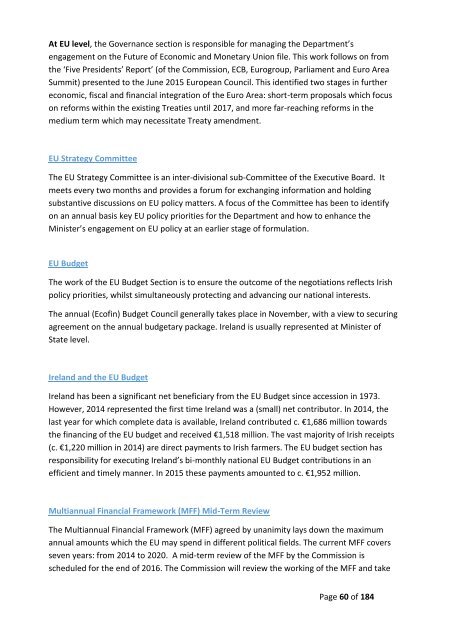Minister’s Brief
20160229%20Minister%20for%20Finance%20Brief%20redacted%20web
20160229%20Minister%20for%20Finance%20Brief%20redacted%20web
You also want an ePaper? Increase the reach of your titles
YUMPU automatically turns print PDFs into web optimized ePapers that Google loves.
At EU level, the Governance section is responsible for managing the Department’s<br />
engagement on the Future of Economic and Monetary Union file. This work follows on from<br />
the ‘Five Presidents’ Report’ (of the Commission, ECB, Eurogroup, Parliament and Euro Area<br />
Summit) presented to the June 2015 European Council. This identified two stages in further<br />
economic, fiscal and financial integration of the Euro Area: short-term proposals which focus<br />
on reforms within the existing Treaties until 2017, and more far-reaching reforms in the<br />
medium term which may necessitate Treaty amendment.<br />
EU Strategy Committee<br />
The EU Strategy Committee is an inter-divisional sub-Committee of the Executive Board. It<br />
meets every two months and provides a forum for exchanging information and holding<br />
substantive discussions on EU policy matters. A focus of the Committee has been to identify<br />
on an annual basis key EU policy priorities for the Department and how to enhance the<br />
<strong>Minister’s</strong> engagement on EU policy at an earlier stage of formulation.<br />
EU Budget<br />
The work of the EU Budget Section is to ensure the outcome of the negotiations reflects Irish<br />
policy priorities, whilst simultaneously protecting and advancing our national interests.<br />
The annual (Ecofin) Budget Council generally takes place in November, with a view to securing<br />
agreement on the annual budgetary package. Ireland is usually represented at Minister of<br />
State level.<br />
Ireland and the EU Budget<br />
Ireland has been a significant net beneficiary from the EU Budget since accession in 1973.<br />
However, 2014 represented the first time Ireland was a (small) net contributor. In 2014, the<br />
last year for which complete data is available, Ireland contributed c. €1,686 million towards<br />
the financing of the EU budget and received €1,518 million. The vast majority of Irish receipts<br />
(c. €1,220 million in 2014) are direct payments to Irish farmers. The EU budget section has<br />
responsibility for executing Ireland’s bi-monthly national EU Budget contributions in an<br />
efficient and timely manner. In 2015 these payments amounted to c. €1,952 million.<br />
Multiannual Financial Framework (MFF) Mid-Term Review<br />
The Multiannual Financial Framework (MFF) agreed by unanimity lays down the maximum<br />
annual amounts which the EU may spend in different political fields. The current MFF covers<br />
seven years: from 2014 to 2020. A mid-term review of the MFF by the Commission is<br />
scheduled for the end of 2016. The Commission will review the working of the MFF and take<br />
Page 60 of 184


